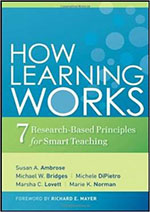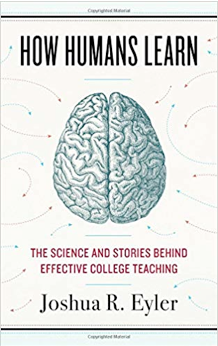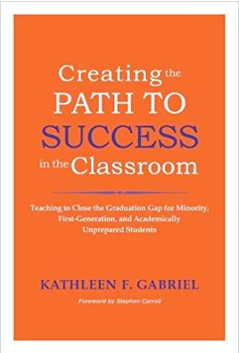Getting Students Ready to Learn
We hope you had a restorative break, and resume your teaching with energy and optimism for the new year and new semester.
FSU will have an exciting guest this spring: Carl Wieman, a Nobel laureate in Physics who has spent decades studying how to improve university education, will visit on February 14, to give a talk at 11:00–so mark your calendars!
The Carl Wieman Science Education Initiative’s website is filled with great resources—for all of us, not just colleagues in the sciences—and we’ll feature some of them in our weekly messages. To harness that New Year’s sense of promise and possibility, let’s begin by considering how we can help our students enjoy the challenges we set for them. The CWSEI argues that “Student motivation is probably the single most important element of learning,” and that “motivating learning is a central element of good teaching.”
We generally think of motivation as something intrinsic to a student: some students seem motivated and some don’t. But in fact, motivation is contextual. Each of us will be less or more motivated to learn or do, to invest our time and effort, given an array of circumstances. When we’re designing learning experiences, there are a number of levers we can use to build (or squelch) our students’ motivation.
First, in order to be motivated, students need to see value in the work. What’s relevant or useful or interesting about the learning we’re asking them to do? Of course we all find our own fields of study inherently fascinating, but it’s not fair to assume that our students will share our predilections. The first day of class is a great opportunity to help students see how exciting the learning will be, and how they’ll use it in the future.
Students also need to feel that they’re capable. If a task or a subject seems beyond their ability to master, they may give up before they begin. This means that if we’re teaching in disciplines or courses that students typically fear, we’ll need to reassure them that although the work will be challenging and the material unfamiliar, learning is within their reach. We’ll need to be transparent about how we’ve designed their learning experiences to get them where they need to go—to tap into their existing knowledge and let them build their understanding and skills. We shape the environment in which our students learn, so our tone and our expectations can foster or stifle motivation. Students must have faith that the environment or context is supportive. If we show our students that we expect them to achieve, they’ll fare far better than if they sense doubt in their ability, or suspicion that they might cut corners.
A last factor in motivation is autonomy. Having some measure of choice and control helps learners to feel invested in their learning (Ambrose et al., 2010; Doyle, 2011). It’s our responsibility as the experts to determine what students need to learn, of course, but often we can let them select the topics for their projects, come up with the standards for class discussions, or even (if we’re using contract grading or specifications grading) decide what grade they intend to earn. Students may surprise you with their thoughtfulness if you invite them to participate in making decisions about their learning.
Welcome back! We wish you an enjoyable first week, and a productive semester. And as always, we’re excited to hear your ideas if you want feedback on your plans for your spring courses.
Upcoming Events:
There are still spots available in a couple of our spring faculty reading groups. Each group will involve a series of three meetings, so please check your calendar to make sure you can attend. Space is limited. RSVP here and we’ll send you your complimentary copy of the book.
 How Learning Works
How Learning Works
Mondays: 2/11, 2/18, 2/25
2:00-4:00 p.m.
This book distills the research on cognition, translating decades of scientific literature into practical advice for university faculty and introducing seven general principles of how people learn. The authors draw on research from cognitive, developmental, and social psychology, as well as educational research, anthropology, etc. The discussion spans issues from memory to motivation, integrating theory with real-classroom examples in practice. Participants will develop strategies for strengthening their own teaching through the application of these principles of cognitive psychology.
 How Humans Learn: The Science and Stories behind Effective College Teaching
How Humans Learn: The Science and Stories behind Effective College Teaching
Wednesdays: 2/20, 2/27, 3/6
2:00-4:00 p.m.
Teaching is a challenging profession. One way to make it easier is to know more about the ways students learn. How Humans Learn surveys research in fields as diverse as developmental psychology, anthropology, and cognitive neuroscience for insight into the science behind learning. Joshua R. Eyler guides the reader through a story that ranges from investigations of the evolutionary record to studies of infants discovering the world for the first time, and from a look into how our brains respond to fear to a reckoning with the importance of gestures and language. In this reading group, we will explore five broad themes—curiosity, sociality, emotion, authenticity, and failure—and discuss practical takeaways for busy teachers.
 Creating the Path to Success in the Classroom: Teaching to Close the Graduation Gap for Minority, First-Generation, and Academically Unprepared Students
Creating the Path to Success in the Classroom: Teaching to Close the Graduation Gap for Minority, First-Generation, and Academically Unprepared Students
Dates TBD by Doodle Poll
Over the past few decades, extensive research has shown that we can significantly reduce achievement gaps and enhance student learning by adjusting our teaching practices and the ways we structure our courses. But where do we start? Kathleen Gabriel’s book provides practical strategies for building our courses to ensure that more students learn more and more deeply. Gabriel offers concrete steps we can take to enhance student motivation, structure class time effectively, prompt critical thinking, design effective assignments, and create classroom climates that promote learning.
Alternative Textbook Grants:
FSU Libraries are offering Alternative Textbook Grants to support FSU instructors in replacing commercial textbooks with alternatives that are available to students at no cost. These alternatives not only save students money but also support student success by ensuring barrier-free access to course materials on day one of a course. Nine grants of $1000 are available to instructors who apply by February 1st, 2019. Grant winners will be encouraged to participate in course refinement consultations with the Center for the Advancement of Teaching. For more information and to apply, see:https://www.lib.fsu.edu/alttextbooks.



